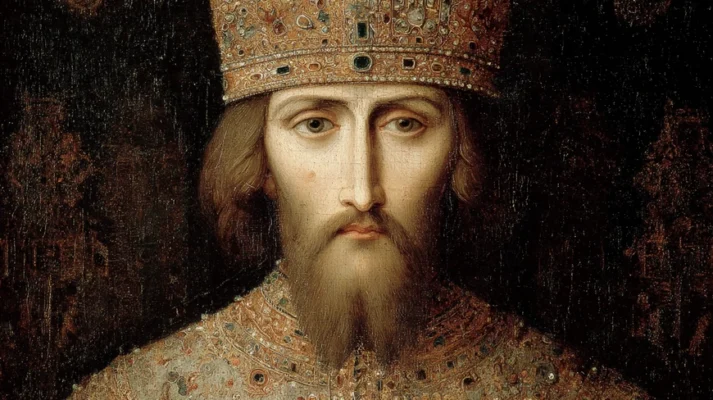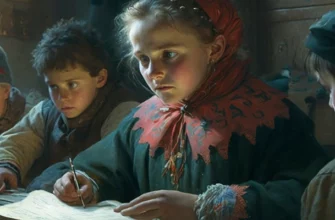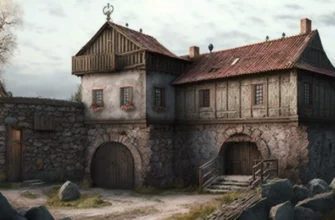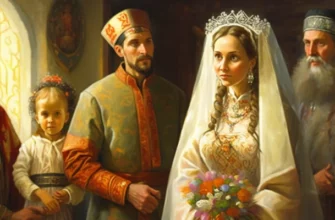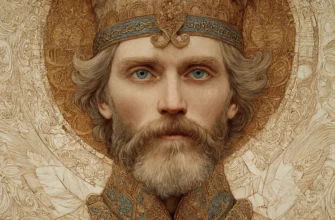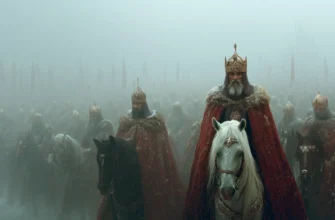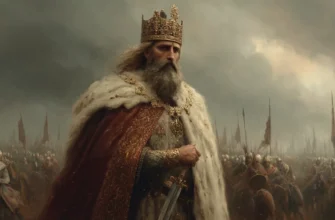Yaroslav the Wise was one of the most prominent rulers of Kievan Rus. He was born around 978 to Prince Volodymyr the Great and Princess Rogneda. After his father’s death, Yaroslav began a struggle for the Kyivan throne with his brother Sviatopolk. In 1019, he won and became the Grand Duke of Kyiv.
During his reign, Kievan Rus achieved political, economic, and cultural prosperity. Yaroslav carried out important administrative and legal reforms, including the creation of the first collection of laws, the Rus’ Pravda. He actively supported the development of education, opened schools, encouraged the rewriting and translation of books, and helped to strengthen Christianity in the state.
During his reign, the majestic St. Sophia Cathedral was built in Kyiv, and Kyiv became an important cultural and spiritual center. Thanks to Yaroslav’s favorable dynastic marriages with European rulers, Rus strengthened its international position. His daughters were married off to the kings of France, Norway, and Hungary, and Yaroslav himself was nicknamed the “father-in-law of Europe” for a reason.
Yaroslav the Wise died in 1054. His reign left a deep mark on history, and his name became a symbol of the wisdom, stability, and state greatness of Kievan Rus.ContentsOrigin and early yearsAscension to the Kyivan throneStruggle for power with brothersUnification of the lands of Rus’State activityAdministrative reformsStrengthening of international relationsCultural and spiritual revivalPersonal lifeDeath and legacyThe memory of Yaroslav the Wise in history and cultureConclusionContents
- Origin and early years
- Ascension to the Kyivan throne
- Struggle for power with his brothers
- Unification of the lands of Rus’
- State activity
- Administrative reforms
- Strengthening international relations
- Cultural and spiritual revival
- Personal life
- Death and legacy
- The memory of Yaroslav the Wise in history and culture
- Conclusion
Origin and early years
Yaroslav the Wise was born around 978 to Prince Volodymyr the Great and Princess Rogneda of Polotsk. He was one of Volodymyr’s many sons, but thanks to his intelligence, firmness of character, and diplomatic skills, he managed to stand out among his brothers. In his younger years, Yaroslav received a good education, which was rare even among princes of the time. He was interested in books, laws, and Christian doctrine, which later influenced his activities as a ruler. Around 1010, he was appointed prince in Novgorod, where he first proved himself as a talented administrator and strategist. It was during this period that Yaroslav began to form his political independence and prepare for the struggle for the Kyivan throne.
The beginning of Yaroslav the Wise’s political career is associated with his appointment by his father, Prince Vladimir the Great, to reign in Novgorod around 1010. Novgorod was an important economic and strategic center, so governing this city was a serious challenge for the young prince. Yaroslav proved himself to be a capable ruler: he strengthened the local government, gathered troops, and established administration.
Already during this period, Yaroslav began to show independence from Kyiv. In particular, he refused to pay an annual tribute to his father, which demonstrates his ambition and desire for independence. After the death of Volodymyr the Great in 1015, Yaroslav entered into a struggle for the Kyivan throne with his brother Sviatopolk, who was accused of murdering his brothers Borys and Hlib. As a result of a long confrontation, including a victory in the Battle of Lyubech in 1016, Yaroslav established himself as the Grand Duke of Kyiv. It was from this moment that his long and glorious rule over Kievan Rus began.
Ascension to the Kyivan throne
Yaroslav the Wise’s ascension to the throne of Kyiv was not easy and was accompanied by a fierce struggle for power. After the death of his father, Prince Volodymyr the Great, in 1015, his brother Sviatopolk the Repentant seized power in Kyiv. It was Sviatopolk who was accused of murdering his brothers Borys and Hlib, who were considered the rightful heirs to the throne. These tragic events aroused the anger of Yaroslav, who was ruling in Novgorod at the time.
Having gathered the Novgorod army and enlisted the support of Varangian mercenaries, Yaroslav opposed Sviatopolk. In 1016, in the Battle of Liubech, Yaroslav won a convincing victory and took Kyiv. However, the struggle continued: Sviatopolk, supported by the Polish king Bolesław the Brave, tried to regain power several more times.
Yaroslav won the final victory in 1019 in the Battle of Alta River, after which he finally established himself as the Grand Duke of Kyiv. His reign ushered in an era of stability, development, and cultural growth for Kievan Rus.
Struggle for power with his brothers
After the death of Volodymyr the Great in 1015, a fierce struggle for the Kyivan throne began between his sons. The most determined rivals were Yaroslav, who reigned in Novgorod, and Sviatopolk, who seized Kyiv immediately after his father’s death. Sviatopolk, seeking to consolidate his power, ordered the murder of his brothers Borys, Hlib, and, presumably, Sviatoslav. These tragic events later became the basis for the canonization of Borys and Hlib as the first saints of Rus.
When Yaroslav learned of Sviatopolk’s crimes, he began to gather an army. He received support from Novgorodians and Varangian mercenaries. In 1016, Yaroslav opposed Sviatopolk and won the Battle of Lyubech, taking Kyiv. However, Sviatopolk, with the help of his father-in-law, the Polish king Bolesław the Brave, briefly regained the capital.
The struggle lasted until 1019, when Yaroslav defeated Sviatopolk in the Battle of the Alta River. After this victory, he finally established himself as the Grand Duke of Kyiv. Subsequently, Yaroslav had to resolve contradictions with his other brother, Mstislav of Tmutarakan. In 1024, they fought a battle near Chernihiv. After that, the brothers agreed to share power: Yaroslav ruled in Kyiv, and Mstyslav ruled on the Left Bank, centered in Chernihiv. After Mstislav’s death in 1036, Yaroslav became the sole ruler of all of Kievan Rus.
Unification of the lands of Rus’
After being enthroned in Kyiv, Yaroslav the Wise set himself the task of uniting the disparate principalities of Kievan Rus into a single strong state. He actively worked to strengthen the central government and subdue the autonomous regions.
One of the key steps in this direction was the conquest of the Polotsk, Smolensk, Chernihiv principalities and other lands that had previously enjoyed considerable independence or belonged to his rivals. Through diplomacy, military campaigns, and dynastic marriages, Yaroslav gradually united most of the Russian lands under his rule.
Particularly important was his victory over his brother Mstislav of Tmutarakan, with whom Yaroslav signed a peace treaty in 1024 on the division of power. However, after the death of Mstislav in 1036, Yaroslav became the sole ruler of all of Kievan Rus, which allowed him to strengthen the state system and increase the role of Kyiv as a political and cultural center.
Thus, Yaroslav the Wise not only restored the unity of Rus’, but also laid the foundation for the country’s further development as a powerful medieval state.
State activity
During his reign, Yaroslav the Wise carried out a number of important reforms that significantly strengthened Kyivan Rus and raised the level of its organization. He strengthened the centralized government, increased administrative control over various regions, and streamlined the system of government. Yaroslav paid special attention to legislation – it was on his initiative that the first written collection of laws of Rus’, known as Rus’ Pravda, was created. This document became the basis of medieval law and regulated social relations, protected the rights of different segments of the population and punished crimes.
Yaroslav also actively developed diplomatic relations with other countries. He arranged dynastic marriages between his children and European monarchs, which greatly enhanced the international prestige of Rus’. In addition, the prince supported the development of cities, trade, and military affairs. Yaroslav’s army was well organized and ready to defend the state’s borders from external enemies.
Thus, the state activities of Yaroslav the Wise became the foundation for the stability, development, and power of Kievan Rus in the eleventh century.
Administrative reforms
Yaroslav the Wise carried out significant administrative reforms aimed at strengthening the central government and improving the governance of Kievan Rus. He strengthened the system of princely administration, organized tax collection, and controlled local princes and officers. To better manage the state, Yaroslav divided the territory of Rus into regions, which were governed by his trusted officials, the governors.
Special attention was paid to the judicial system: Yaroslav expanded and unified judicial functions, which helped maintain order and justice in the country. He also introduced clear rules for the transfer of power to reduce internal disputes between princes.
These reforms significantly improved the efficiency of public administration, and the power of the Grand Duke became more stable and authoritative. Yaroslav’s administrative innovations laid the foundations for a centralized state that could function effectively and defend itself against external threats.
During the reign of Yaroslav the Wise, the development of the legislation of Kievan Rus significantly intensified. The most famous achievement of this period was the first written collection of laws, Ruska Pravda, created on his initiative. This document systematized the norms of customary law, regulated social, property, family, and criminal relations.
“The Rus’ Pravda became the basis for the further development of the state’s legal system, contributed to the strengthening of social order and the protection of the rights of various segments of the population. It introduced penalties for theft, murder, forgery, and other crimes, as well as regulated the procedure for inheritance and land disputes.
Yaroslav’s legislative reforms reflected his desire to create a fair and stable system of government that would protect the interests of both the princely authorities and ordinary people. “Russkaya Pravda remained the main legal code of Rus for several centuries and had a significant impact on the formation of law in neighboring states.
“Ruska Pravda is the first written collection of laws of Kievan Rus, created on the initiative of Prince Yaroslav the Wise in the first half of the 11th century. It became the basis for the development of the legal system of medieval Rus and one of the most important monuments of ancient Russian culture.
The collection contained norms of civil, criminal, and family law, regulated property relations, inheritance, liability for crimes, and the delineation of rights and obligations of different social strata. “Ruska Pravda contributed to the establishment of social order, protection of private property, and justice.
This legislative code was an important step towards centralizing state power and unifying legal norms in Russia. It had a lasting impact on the development of law not only in Kievan Rus, but also in neighboring Eastern European countries.
Strengthening international relations
During the reign of Yaroslav the Wise, Kievan Rus actively developed diplomatic relations with other European states. Yaroslav understood the importance of international cooperation for the security and prosperity of his state, so he arranged numerous dynastic marriages between his children and the ruling families of other countries.
His daughters became queens of France, Norway, Hungary, and other countries, which greatly increased the authority of Russia in the international arena. These marriages helped to strengthen political and trade ties, and provided support from allies in the event of external threats.
In addition, Yaroslav supported diplomatic missions that exchanged ambassadors with Byzantium, Rome, Western Europe, and Scandinavia. Thanks to this, Kievan Rus became an important player on the political map of medieval Europe.
This active strengthening of international relations helped to ensure peace and stability in the region and create favorable conditions for the development of culture, trade, and statehood.
Cultural and spiritual revival
During the reign of Yaroslav the Wise, Kievan Rus experienced a significant cultural and spiritual upsurge. The prince actively supported the development of education, art, and religious life. He helped build churches and monasteries, the most famous of which is St. Sophia Cathedral in Kyiv, one of the symbols of Christian faith and cultural prosperity.
Yaroslav also initiated translations of religious texts and books from Greek and Latin, promoting literacy and spiritual knowledge among the princely elite and priesthood. During his reign, schools were opened to teach writing, theology, and law.
His support of book publishing and education helped preserve and spread spiritual values that strengthened the unity and stability of the state. Thanks to these efforts, Kyiv became an important center of Christian culture in Eastern Europe.
Thus, the cultural and spiritual revival under Yaroslav the Wise laid the foundation for the further development of Ukrainian and East Slavic civilization.
During the reign of Yaroslav the Wise, much attention was paid to the development of religious architecture and education. He initiated the construction of majestic churches that became symbols of the spiritual strength and power of Kievan Rus. The most famous of them is St. Sophia Cathedral in Kyiv, a grandiose building that impresses with its beauty and artistic decoration, which became the center of the Orthodox faith and cultural life.
In addition to churches, Yaroslav promoted the establishment of schools at monasteries and churches, where they taught literacy, church singing, theology, and writing. Such schools helped to raise the level of education among the clergy and nobility, and to form the intellectual elite of the state.
The construction of churches and schools was an important step in the formation of a unified cultural and spiritual community that united different regions of Russia. These investments in culture and education strengthened the state and left behind a vivid legacy that has survived to this day.
Yaroslav the Wise attached great importance to the development of education and books in Kievan Rus. He promoted the opening of schools at churches and monasteries, where they taught literacy, religious texts, writing, and theology. These educational institutions trained priests, civil servants, and intellectuals who could effectively govern the state and support spiritual life.
The prince also encouraged the rewriting and translation of books from Greek, Latin, and other languages, making spiritual and secular knowledge more accessible to the population. Under his leadership, Kyiv became an important center of cultural exchange and education in Eastern Europe.
His support for education and books contributed to the preservation of cultural heritage, the formation of national identity, and the development of science and art. This was one of the key factors in the success and stability of Kyivan Rus under Yaroslav the Wise.
During the reign of Yaroslav the Wise, considerable attention was paid to translating important religious and secular texts from Greek, Latin, and other languages into Old Rus. These translations contributed to the spread of Christian faith, education, and culture among the population of Kievan Rus. They also helped integrate the state into the Christian world and establish contacts with other European countries.
An important cultural achievement of this period was chronicling, the systematic recording of historical events. Yaroslav the Wise encouraged the creation of chronicles, which became the main source of knowledge about the history, traditions, and life of Kievan Rus. Chronicles not only recorded events but also shaped national identity and preserved cultural heritage for future generations.
Thus, translations and chronicling under Yaroslav contributed to the development of writing, education, and the preservation of the historical memory of the people.
Personal life
Yaroslav the Wise was married to several women, the most famous of whom was Ingigerda, the daughter of a Swedish jarl. This marriage strengthened the diplomatic ties of Kievan Rus with the Scandinavian countries. Yaroslav had many children who played an important role in politics and dynastic alliances: his daughters became wives of European kings, and his sons became princes of various lands of Rus.
Yaroslav was famous for his wisdom, restraint, and justice. Although he had a physical handicap – he limped due to a childhood illness or injury – this did not prevent him from actively participating in public affairs and military campaigns.
Yaroslav’s personal life was closely connected with his political activities, as dynastic marriages and family ties helped to strengthen his power and expand the influence of Kievan Rus in Europe.
Yaroslav the Wise had a large family-several wives and numerous children-who played an important role in the political and dynastic life of Kievan Rus. His main wife was Ingigerda, the daughter of a Swedish jarl, whose marriage strengthened Rus’ ties with Scandinavia.
Yaroslav’s sons ruled various principalities of Rus, continuing their father’s work. The most famous were Izyaslav, Svyatoslav, Volodymyr, and Vsevolod, who played an important role in the state’s politics after Yaroslav’s death.
Yaroslav’s daughters became wives of European monarchs: Anne became Queen of France, Eudocia became the wife of the Byzantine Emperor, and Anastasia became Queen of Hungary. Thanks to these dynastic marriages, Kievan Rus strengthened its international ties and influence in Europe.
The family of Yaroslav the Wise became the basis of a dynasty that ruled Rus for many generations, laying the foundation for the further development of the state.
Death and legacy
Yaroslav the Wise died in 1054, leaving behind a great legacy as an outstanding ruler of Kievan Rus. His reign was marked by the strengthening of centralized power, the development of legislation, culture, and education. Thanks to his reforms, the state became strong and stable, and the international prestige of Rus’ grew significantly.
Yaroslav left behind the first written collection of laws, the Russkaya Pravda, which became the foundation for the legal system of medieval Russia. He supported the construction of churches and the development of education, which contributed to the spiritual and cultural revival of the country.
The legacy of Yaroslav the Wise influenced the further development of Ukrainian, Belarusian, and Russian cultures and statehood. His name still symbolizes wisdom, justice, and strong leadership.
His death was natural, caused by aging and illnesses that appeared after many years of active rule and participation in military campaigns. It is known that the prince had health problems, in particular, he limped due to an injury or illness he received in childhood.
On the eve of his death, Yaroslav the Wise took care of his succession by dividing his lands among his sons, which became the basis for further dynastic power. His death marked the end of a great era in the history of Kievan Rus, but at the same time it was the beginning of a new period when power was distributed among his descendants.
Yaroslav was buried in St. Sophia Cathedral in Kyiv, symbolizing his importance as a ruler and defender of the Orthodox faith.
The memory of Yaroslav the Wise in history and culture
Yaroslav the Wise left a deep mark on the history and culture of Kievan Rus and the entire East Slavic world. His name has become a symbol of wisdom, justice, and state leadership. Historical chronicles depict him as a great reformer and patron of culture.
In culture, Yaroslav the Wise is reflected in literature, art, folk legends and songs. His figure is often associated with the heyday of Kyivan Rus, in particular with the construction of St. Sophia Cathedral, one of the greatest architectural monuments of the era. In Ukraine and other countries, there are monuments, museums, and streets named in his honor.
Honoring the memory of Yaroslav the Wise supports national identity and reminds us of the importance of wise governance and cultural development, which is still relevant today. His legacy inspires historians, artists, and politicians, remaining an integral part of Eastern European history.
Conclusion
Yaroslav the Wise was a prominent prince of Kievan Rus, whose reign was an era of flourishing state, culture, and law. He united the scattered lands of Rus, laid the foundations for centralized government, and created the first written collection of laws, Rus’ Pravda. Thanks to his reforms, diplomacy, and support of education, Kievan Rus strengthened its international authority and cultural level.
The legacy of Yaroslav the Wise is of great importance for the history of the East Slavic peoples and remains a symbol of wisdom, justice and strong leadership. His activities laid the foundation for the further development of Ukrainian statehood and culture, and influenced the formation of legal and moral principles of society.
